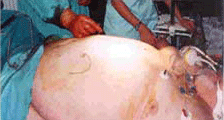Genes may determine success of gastric bypass surgery

Danville, PA
Researchers study genetic factors in success of gastric bypass surgery and other bariatric procedure.
Two obesity-related genetic variations may be associated with higher body mass index (BMI) among severely obese patients (BMI of 40 or higher) who have bariatric surgery to help them lose weight, say American researchers.
Bariatric surgery is a highly effective treatment for severely obese patients, according to background information in the study. However, some patients don't lose weight after bariatric surgery.
"Identification of variables that determine the success of bariatric surgery have shown little consistency, and long-term success may depend on not yet identified factors," noted the researchers at the Geisinger Clinic in Danville, Pa.
They studied 707 severely obese (average BMI 51.2) patients who had gastric bypass surgery. Blood samples from the patients were analyzed for two common single nucleotide polymorphisms (SNPs) previously found to be associated with obesity. SNPs are variations caused by alteration of single building block of DNA.
The researchers found that about 21 percent of the patients had two copies of one obesity-related SNP, 13 percent had two copies of the other SNP, and 3.4 percent had two copies of both SNPs.
There was no significant BMI difference between patients with two identical copies of either one of the SNPs and those without two identical copies. However, patients with either two copies of both SNPs, or two copies of one and one copy of the other SNP, had much higher BMIs than other patients. Less than 20 percent of the patients in the study had these genetic features.
The findings were published in the March issue of the journal Archives of Surgery. More >>

0 Comments:
Post a Comment
<< Home